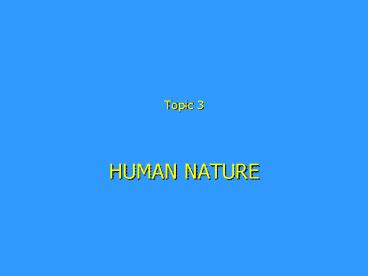HUMAN NATURE - PowerPoint PPT Presentation
1 / 21
Title:
HUMAN NATURE
Description:
Can determine the shape' of their lives through reasoned ... 1. Nihilists / buddhists. Desire to lose their 1st order desires. That's what makes them a person! ... – PowerPoint PPT presentation
Number of Views:64
Avg rating:3.0/5.0
Title: HUMAN NATURE
1
Topic 3
- HUMAN NATURE
2
personhood
- A person is an autonomous being
- Can determine the shape of their lives through
reasoned free choices - But there is an argument to the conclusion that
autonomy is illusory
3
The Problem of determinism
- Freedom would seem to be incompatible with
determinism - I am not free to act or think because my actions
and thoughts are determined by the laws of nature
4
compatibilism
- Actions can be free and determined
- Soft determinism
- How?!
- a few intelligible definitions would immediately
have put an end to the whole controversy (Hume,
Enquiry) - We just need to get clear on what necessity and
freedom mean
5
Shaping ones life
- one essential difference between persons and
other creatures is to be found in the structure
of a persons will - Persons have 2nd order volitions
- Freedom amounts to the possession of second order
volitions - Freedom contrasted with constraint rather than
with determinism - One can be constrained by chains, addictions or
ones 1st order desires
6
- Scientific / biological account of 1st order
desires - Brain states / computational states
- Perhaps teleological account of the intentional
content of desires - Desire for water
- The flux of such brain states is determined by
laws of cognition (laws of nature)
7
- 2nd order desires could also be given such a
description - Theyre also controlled by the laws of nature
- My actions are therefore determined, and yet I am
free
8
Problems
- 1. Does Frankfurts account fit our concept of a
person? - Can we think of people without 2nd order
volitions, or those who are capable of 2nd order
volitions, but who we would not call people?
9
- 1. Nihilists / buddhists
- Desire to lose their 1st order desires
- Thats what makes them a person!
- Paradoxical?
10
- 2. people who are happy in their skin
- Like their desires just the way they are
11
2. Alternative possibilities
- Freedom entails that I could have done something
else in any given situation - alternative courses of action open to me
- not so if one is a determinist
- And thus not so if one is a compatibilist
12
- "An Intelligence knowing all the forces acting in
nature at a given instant, as well as the
momentary positions of all things in the
universe, would be able to comprehend in one
single formula the motions of the largest bodies
as well as the lightest atoms in the world,
provided that its intellect were sufficiently
powerful to subject all data to analysis to it
nothing would be uncertain, the future as well as
the past would be present to its eyes." Laplace
13
- Humes strategy is a wretched subterfuge with
which some persons allow themselves to be put
off, and so think that they have solved, with a
petty word jugglery, a problem at the solution of
which centuries have laboured in vain. (Kant,
1788 189-90)
14
But is it so easy to reject compatibilism?
- We must be clear on the radical nature of both
incompatibilist positions - If neither of these are acceptable, then perhaps
we have to accept the compatibilist notion of
freedom
15
1. Libertarianism
- Most of those who have written about the
emotions and human conduct seem to be dealing not
with natural phenomena that follow the common law
of Nature but with phenomena outside of Nature.
They appear to go so far as to conceive man in
Nature as a kingdom within a kingdom. They
believe that he disturbs rather than follows
Natures order. (Spinoza, Ethics)
16
- In effect it would be very singular that all
nature, all the planets, should obey eternal
laws, and that there should be a little animal
five foot high, who, in contempt of these laws,
could act as he pleases, solely according to his
caprice. (Voltaire, The Ignorant Philosopher)
17
- Our will has a causal effect on our bodies, but
the will itself is uncaused - From outside of nature we are able to divert
material objects our body, for one -- from
their natural paths - (i) Can we conceive of events that do not have a
cause? - (ii) how does the will, something outside of
nature, come to have a causal effect on natural
bodies?
18
Hard determinism
- Free will is an illusion
- Problems
- 1. someones only responsible for their actions
if they perform them freely - Can only praise or blame someone if their actions
are free - Morality depends on freedom
19
- 2. we are incapable of believing that we are not
free - No-one can therefore actually be a hard
determinist
20
But perhaps nature isnt deterministic
- Quantum mechanics claims that nature is at its
core indeterminate - The behaviour of sub-atomic particles is not
deterministic - Perhaps these are involved in neuronal activity
in the brain - The flux of our brain states would therefore not
be deterministic and thus there is no clash with
free will
21
responses
- 1. quantum mechanics is controversial
- Einstein God does not play dice
- 2. such an account would make the flux of our
brain states prey to chance - Our actions would not therefore be the result of
our free choice - They would be random































